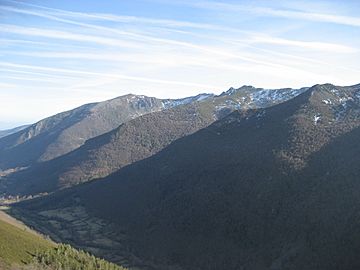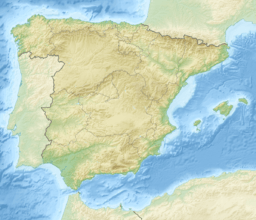Serra dos Ancares facts for kids
Quick facts for kids Serra dos Ancares |
|
|---|---|
| Sierra de los Ancares | |

General view of the range
|
|
| Highest point | |
| Peak | Cuiña |
| Elevation | 1,987 m (6,519 ft) |
| Dimensions | |
| Length | 95 km (59 mi) NE/SW |
| Width | 32 km (20 mi) NW/SE |
| Geography | |
| Location | Lugo Province, Galicia León Province, Castile and León |
| Country | Spain |
| Parent range | Galician Massif |
| Geology | |
| Orogeny | Variscan orogeny |
| Age of rock | Ordovician |
| Type of rock | Slate, limestone, sandstone, quartzite |
The Serra dos Ancares (also called Sierra de los Ancares in Spanish) is a beautiful mountain range in north-west Spain. It's part of the larger Galician Massif and stretches from the western part of the Cantabrian Mountains in Asturias.
Contents
Geography of the Ancares Mountains
This mountain range acts like a natural border between two areas of Spain: Galicia and Castile and León.
The tallest mountain here is Cuiña Peak, standing at 1,987 meters (about 6,519 feet) high! Other important peaks include Mustallar (1,935 meters) and Miravalles (1,969 meters). A smaller mountain range, the Serra do Courel, lies just south of the Ancares, running in the same direction.
Plants and Trees in Ancares
Near rivers and streams, you'll find trees like willow and European alder. Further away, there are chestnut, ash, common hazel, oak, and common holly trees. If you climb higher than 1,600 meters (about 5,250 feet), the trees become less common. Instead, you'll see brushland with plants like tree heath and juniper.
Traditional Buildings: Pallozas
For a long time, many small villages in this area were quite isolated. Roads were not built until the mid-1900s. A special type of building found here is called a palloza (or casa teito). These are old stone houses, usually round or oval-shaped, with unique roofs.
Ancares as a Protected Area
The Sierra de los Ancares is recognized for its important natural environment.
It is named a Site of Community Importance in the province of León. This means it's a special area for nature within Europe.
In 2006, a part of the region called Os Ancares Lucenses y Montes de Cervantes, Navia y Becerrea was named a UNESCO Biosphere Reserve. This is a place where people try to balance nature conservation with human activities. There is also another biosphere reserve called Los Ancares Leoneses.
See also
 In Spanish: Sierra de Ancares para niños
In Spanish: Sierra de Ancares para niños
- Los Ancares
- Os Ancares
 | DeHart Hubbard |
 | Wilma Rudolph |
 | Jesse Owens |
 | Jackie Joyner-Kersee |
 | Major Taylor |






